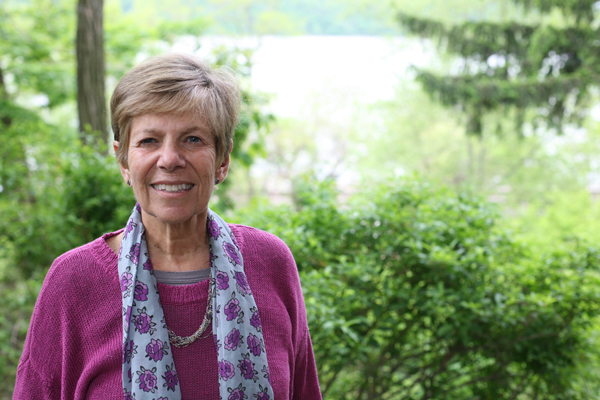
Iris Burkat”™s corporate history was in finance and travel-related services ”“ “mostly travel” ”“ for the likes of American Express, CitiBank and Merrill-Lynch. The single moment that told her it was time to move on came during “one of those recessions in the ”™90s,” she said, and it came with an audience.
“I was at a conference in front of 300 people and the head of the company introduced me as a consultant,” Burkat said. “I was shocked. Up till that moment I had been full time. I was now a sole practitioner working with the same clients.”
Consultancy agreed with her as she raised son Oliver, now 28 and living in Brooklyn. “It was a wonderful time for me,” she said. Her consulting included client work in travel, finance and fundraising. It was also “slow and busy, busy and slow,” lacking consistency. “I needed focus.”
Last fall, Burkat enrolled in a Women”™s Economic Development Center (WEDC) course. “I was bullied by my instructor until I could explain my focus,” she said. She graduated Dec. 12.
Her class was one of three offered countywide. She now runs her one-woman business from her Hastings home, acknowledging help from husband, Howard Burkat. “Vice president and communications director,” she called him. With multiple University of Pennsylvania degrees between them, plus her MBA from NYU, they possess a worthy in-house talent pool.
“What I liked about WEDC”™s mission was that working with WEDC would help me focus where I wanted to take my consulting company,” she said. “Having worked for large companies, I thought I could do everything. As a sole practitioner, I did not have the time or the resources to do everything. I had helped develop strategic plans for so many companies ”“ long- and short-term ”“ but I never had a plan for myself. My understanding was WEDC was good at this. It worked out exactly as I expected.
“As an entrepreneur working more or less on your own, the focus and initial planning is what”™s most important: knowing what you”™re up against.”
Specifically, Burkat learned from WEDC of the need for an elevator pitch, a marketing plan, knowledge of the competition and of the market. “Cash flow was a real eye-opener,” she said. “They talked about how much you need to put out before you can bring in.”
Persephone Zill is senior program specialist and business counselor for WEDC, overseeing training programs at its 1133 Westchester Ave., White Plains, headquarters. WEDC is classified a women”™s business center of the U.S. Small Business Administration, which partly funds it, and is also an arm of the state Economic Development Corp.”™s entrepreneurial assistance program. WEDC employs 10, but it actively also works with outside consultants.
“We hear of the difficulties encountered by those over 50 who are looking for work,” Zill said. “At WEDC, we don”™t have to adapt because we”™ve been here to help in this area for 15 years.”
WEDC offers three, 15-week, 60-hour courses: one each in Yonkers, White Plains and, the most recent class addition, in Spanish in New Rochelle. A class typically has 20 students and of those two or three are older than 50. The courses cost $120.
The older students fall into one of three categories, according to Zill: those who can”™t find jobs in a tough economy; those who have reached retirement age, yet still need income; and those with a passion.
“It”™s hard to say if there”™s a consistent trend, but those are the big three reasons we see,” she said.
One trend, however, has been the shift from goods to services. “Fewer products, more services online,” Zill said. “For the post-50 students, it tends to be more consulting work, but we also get interior design, hair cutting, restaurants, the full range of business ideas.” Nineteen percent of the students are men, who are welcome.
Another trend has been toward healthy foods and holistic-themed businesses. “We are seeing people who want to enter the supply line for companies like Whole Foods,” she said. Three WEDC graduates have become part of the Whole Foods supply chain.
Sometimes, the process leads to no business at all and Zill calls those results a success, too. About 25 percent of graduates will actually start a business. But for all students, said Zill, “We offer a lot of resources after the 15 weeks,” including monthly workshops, usually at 1133 Westchester Ave., and a November networking event. A typical workshop topic is working with the government. “For that we would have government agents there to answer questions.”
Burkat”™s first client is governmental: a travel-and-tourism blueprint for a state government in southern India. Projects in Mexico and South Africa also are afoot with the couple”™s third trip to South Africa upcoming, its goal to streamline networks between the South African government and private tour operators.
“I”™m following the WEDC recipe,” Burkat said. “I was an expert in travel services and I loved it. I love finance, too, but WEDC has forced me to make a choice and I have opted for travel. At WEDC, one of the most important things they teach is to do what you love.”
Those who make the leap into business are eligible for the LEAP Award, eight of which will be handed out at WEDC”™s annual luncheon June 12 at Tappan Hill in Tarrytown. Each LEAP (Lanza Enterprise Award Program) award comes with a $5,000 check, owing to the support of Harrison-based Lanza Family Foundation. The public is invited to the lunch, which has a link at the WEDC.org website.
















